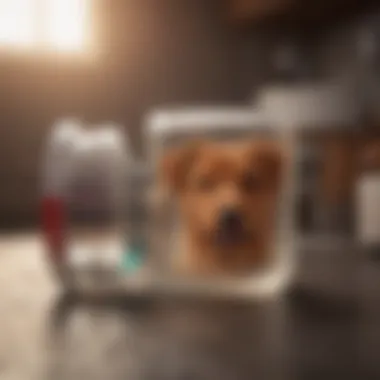Understanding Explosive Bowel Movements: Insights & Solutions


Intro
Experiencing explosive bowel movements every morning in pets can be concerning for many owners. Understanding the underlying causes and potential solutions is crucial for ensuring gastrointestinal health. This problem may not only disrupt the daily routine of pets but also impact their overall quality of life.
This article explores various factors that can contribute to this condition, including dietary influences, possible health issues, and other lifestyle elements. By examining these aspects, pet owners can make informed decisions that effectively address digestive problems.
Understanding Your Pet
To tackle the issue of explosive bowel movements, it is essential to comprehend the characteristics of your pet, which can directly influence their health. Factors such as breed, temperament, and special needs play a role in gastrointestinal functions, as differences can exist among various breeds.
Breed Traits
Certain breeds may be predisposed to digestive issues. For instance, bulldogs and terriers can have sensitive stomachs. Understanding these breed-specific digestive traits will aid in tailoring care effectively.
Common Temperaments
A pet's temperament can affect their eating habits and stress levels. An anxious pet may eat too quickly, leading to digestive issues. Identifying and addressing temperament-related behaviors can be beneficial in managing bowel health.
Special Needs
Every pet is unique, and some may require special diets or care strategies. If your pet has pre-existing health issues, it's crucial to consult with a veterinarian to create an appropriate care plan.
Pet Care Essentials
Providing proper nutrition and healthcare is vital for maintaining a healthy digestive system in pets.
Nutrition and Feeding Guidelines
Feeding pets a balanced diet that matches their age, breed, and size is essential. Avoid sudden dietary changes, as they can shock the digestive system and lead to irregular bowel movements. High fiber foods can promote regularity, while probiotics can help maintain gut flora.
Grooming Tips and Techniques
Regular grooming not only keeps pets looking good but also helps to identify any health concerns. For example, a healthy coat can be an indicator of good nutritional status.
Health and Wellness
Routine vet check-ups are important. Vaccinations, parasite control, and dental care all contribute to overall health, which directly affects digestion.
Training and Behavior
Train your pet to understand routines. This can improve their behavioral responses and ease stress related to feeding.
Basic Training Techniques
Establish clear feeding routines. Teaching commands like wait and leave it can slow down eating habits and reduce stress.
Behavioral Problems and Solutions
If a pet displays destructive behavior linked to anxiety, solutions like increased physical activity or training can reduce stress.
Mental Stimulation Activities
Engaging a pet’s mind can decrease boredom and anxiety. Consider using puzzle toys that dispense food slowly, which also promotes digestive health.
Engaging with Your Pet
Building a strong bond with pets can also benefit their well-being. Understanding how to engage with them is essential for good digestive health.
Interactive Games and Toys
Use toys that encourage slow feeding or interactive games that can make meal times more enriching.
Safe Outdoor Activities
Outdoor activities are vital for physical health. Safe practices during walks can prevent stress and improve bowel health.
Family-Friendly Pet Interactions
Educating all family members about proper interactions with pets can minimize stressors that can affect digestion.
Pet Adoption and Integration
Adopting a pet comes with responsibilities, especially in adjusting to their dietary and health needs.
Choosing the Right Pet for Your Lifestyle
Assess your daily schedule and living environment before adopting. A pet that matches your lifestyle can prevent many stress-related issues.


Preparing Your Home for a New Pet
Ensure your home environment is safe and suitable. Remove hazards and set up a designated eating area for your new pet.
Tips for Smooth Preface
Slowly introduce your new pet to their surroundings. Give them time to adjust and promote positive experiences during the transition period.
Understanding the symptoms of explosive bowel movements can guide pet owners towards optimal health solutions. A proactive approach, coupled with a sound dietary and training strategy, can alleviate many gastrointestinal issues.
By taking a comprehensive approach to caring for pets, owners can mitigate the impact of dietary and lifestyle choices on digestive health.
Prelims
Understanding explosive bowel movements in pets is crucial for both pet owners and animal enthusiasts. This article delves into a phenomenon that many may overlook but can have significant implications on a pet's well-being. Explosive bowel movements, particularly when they occur consistently every morning, can indicate underlying health issues or be influenced by various factors including diet and environment.
It is essential to consider how daily routines and choices impact digestive health. Many pet owners may not realize that specific foods or sudden changes in diet can lead to these disturbances. By educating oneself on the factors causing these bowel movements, respondents can take proactive steps toward maintaining their pets' health.
The following sections will illustrate common causes, especially dietary factors and medical conditions, while also addressing the implications these movements can have on daily life. Recognizing the signs can empower owners to instigate meaningful changes in an animal’s diet or routine.
Understanding and addressing explosive bowel movements can lead to enhanced quality of life for pets and peace of mind for owners.
Moreover, managing explosive bowel movements is not merely about alleviating a nuisance; it is about fortifying the bond between pet and owner through informed care. Recognizing the importance of addressing this topic can ultimately foster a healthier, happier life for pets.
Defining Explosive Bowel Movements
Defining explosive bowel movements is crucial to comprehending their impact on the well-being of pets. This section elucidates the nuances involved in understanding this phenomenon. It involves recognizing the signs, distinguishing between normal and abnormal episodes, and identifying the potential influences behind such occurrences. A clear definition is foundational for pet owners and enthusiasts to accurately assess their pets' health and progress.
Characteristics of Explosive Bowel Movements
Explosive bowel movements typically characterize themselves through sudden, intense urges and the rapid passage of stool. These bowel movements may often accompany loud noises, indicating a forceful expulsion, which can create concern among pet owners. Observations made during these episodes, such as volume and consistency, are vital for diagnosing underlying issues.
Some common characteristics include:
- Consistency: Often watery or very loose.
- Color: May vary, but abnormal colors can hint at health issues.
- Accompanying Symptoms: Such as lethargy, vomiting, or changes in appetite, can indicate more serious conditions.
Understanding these characteristics not only aids in identifying the problem but also informs the subsequent steps to take.
Frequency and Timing
The frequency and timing of explosive bowel movements can provide essential insights into a pet’s digestive health. Most pets experience normal bowel movements one to two times a day. If a pet presents explosive bowel movements every morning, it raises the question of whether there is an underlying cause.
In particular, owners should pay attention to:
- Routine Changes: Changes in feeding schedules or the introduction of new foods can disrupt normal patterns.
- Age and Breed Factors: Some breeds may have more delicate digestive systems.
- Morning Patterns: If the timing is consistently in the mornings, consider if there are any environmental factors, such as stress or specific nighttime routines, that could be influencing this behavior.
Moreover, monitoring the frequency over several days can help in documenting any patterns that may warrant further investigation.
Common Causes
Understanding the common causes of explosive bowel movements each morning is crucial for pet owners. This knowledge helps in identifying potential issues and managing them effectively. By delving into different aspects, we can learn how specific dietary factors, medical conditions, and environmental influences affect our pets’ digestive health.
Dietary Factors
Diet plays a significant role in the digestive system of pets. Various elements within their nutrition can lead to explosive bowel movements. Addressing these factors can enhance understanding and control over the situation.
High-fiber foods
High-fiber foods are often lauded for promoting healthy digestion. They add bulk to the stool, facilitating smoother bowel movements. This characteristic makes high-fiber foods a popular choice in many pet diets. However, introducing these foods should be done gradually to prevent sudden changes. The unique feature of high-fiber diets is the ability to regulate bowel health; yet, excessive intake may result in gas or discomfort in some pets.
Food intolerances
Food intolerances can also play a critical role in causing explosive bowel movements. This refers to the difficulty some pets have in digesting certain ingredients. Common culprits include grains, certain proteins, and dairy products. Identifying these intolerances can lead to significant improvements in a pet's digestive comfort. However, while eliminating problematic foods may benefit the pet, it also requires careful management to ensure a balanced diet.
Rapid dietary changes
Rapid dietary changes can significantly upset a pet's digestive system. When the diet changes suddenly, the gut may struggle to adapt, leading to explosive bowel movements. Such adjustments should be made slowly over time. Gradual transition offers the digestive system time to adjust, minimizing risks of gastrointestinal upset. Understanding this unique feature is key to promoting long-term digestive health.
Medical Conditions
Various medical conditions can cause explosive bowel movements in pets. Recognizing these can be paramount for prevention and management.
Gastrointestinal disorders
Gastrointestinal disorders can manifest in various ways, including diarrhea and explosive bowel movements. These disorders often disrupt normal digestive processes. By identifying these conditions, early interventions can be implemented, potentially preventing more severe issues down the line. However, managing gastrointestinal disorders often involves veterinary assistance and ongoing monitoring.
Parasites
Parasites are another possible cause of explosive bowel movements and are relatively common in pets. Worms or protozoans can irritate the gut lining, leading to gastrointestinal distress. Regular deworming and stool checks can prevent infestations. Nonetheless, diagnosing parasitic infections requires understanding subtle behavioral changes in pets, which can be challenging.


Inflammatory bowel disease
Inflammatory bowel disease affects the lining of the intestine, resulting in inflammation and discomfort. This condition can lead to various gastrointestinal symptoms, including explosive bowel movements. Early recognition of signs may lead to better management strategies, but treatment often involves dietary changes and medications. Such unique features allow for comprehensive care to reduce symptoms.
Environmental Influences
Environmental factors also influence digestive health and can contribute to explosive bowel movements. These include stress and changes in daily routine.
Stress factors
Stress factors can heavily impact a pet’s digestive system. Emotional stress from changes in the household, such as new pets or family members, directly affects their bowel habits. Managing stress in pets through routine, safe spaces, and gentle interaction can mitigate these digestive issues.
Changes in routine
Changes in routine, including feeding schedules or exercise, can confuse pets and lead to explosive bowel movements. Pets thrive on consistency, and disruptions may cause anxiety or digestive upset. Keeping a stable daily routine helps maintain digestive health and alleviates potential issues.
Exposure to toxins
Exposure to toxins can result in gastrointestinal distress. This can include household chemicals, certain plants, or spoiled food. Identifying and removing such toxins from environments is essential. While this unique feature is manageable, the consequences can be severe, emphasizing the need for vigilance in pet care.
Understanding these common causes is a step toward better managing and preventing explosive bowel movements. Taking proactive measures can enhance the overall well-being of pets.
Implications of Morning Explosive Bowel Movements
Morning explosive bowel movements can significantly affect the quality of life for both pets and their owners. Understanding the implications of this phenomenon is essential. It helps identify the underlying causes and addresses them effectively. By examining how these explosive episodes affect daily routines, social interactions, and overall health, pet owners can make informed decisions that enhance their pets' well-being.
Impact on Daily Life
The occurrence of explosive bowel movements each morning poses various challenges in daily life. For instance:
- Routine Disruption: Pet owners may find their mornings starting in chaos, as cleaning up becomes a priority. This shift can affect time management, leaving little room for other responsibilities.
- Social Considerations: Frequent bowel issues may limit outings or visits to friends and family. Concerns about potential accidents can lead to social withdrawal.
- Emotional Stress: Dealing with unpredictable bowel movements can cause anxiety for both the pet and the owner. Pets may feel discomfort, and owners may experience stress, leading to a cycle of negative effects.
Behavioral Changes
Affected pets might also exhibit changes in behavior. They could become anxious or withdraw from activities they once enjoyed. Understanding the impact is vital for addressing behavioral issues and improving their quality of life.
Potential Health Risks
Beyond the immediate inconvenience, morning explosive bowel movements can signal serious health risks. If left unaddressed, the following conditions may arise:
- Dehydration: Frequent diarrhea puts a pet at risk for dehydration. It is essential to monitor water intake closely. Dehydration can lead to more severe complications if not treated properly.
- Nutritional Deficiencies: Explosive bowel movements may result in the malabsorption of essential nutrients. Pets can suffer from deficiencies, which affect their overall health.
- Development of Serious Disorders: Chronic gastrointestinal disturbances could indicate underlying health issues. Conditions like inflammatory bowel disease or infections may arise, requiring more intensive medical intervention.
Diagnostic Approaches
Understanding the underlying causes of explosive bowel movements in pets is vital for effective management and resolution. The section of Diagnostic Approaches emphasizes the need for comprehensive evaluations and assessments. By combining veterinary evaluations with at-home observations, pet owners can gain deeper insights into their pets' gastrointestinal health. This dual approach allows for more informed decisions regarding dietary choices and lifestyle adjustments.
Veterinary Evaluations
Veterinary evaluations are a key component in diagnosing the causes of explosive bowel movements. A veterinarian is equipped with the necessary knowledge and tools to assess the animal's health comprehensively. This may include:
- Physical examinations to check for signs of distress or discomfort.
- Blood tests to evaluate organ function and identify any systemic issues.
- Fecal examinations to detect parasites or infections that could contribute to digestive problems.
Consulting a veterinarian provides clarity and helps rule out serious medical conditions. If identified early, many gastrointestinal issues can be managed effectively, improving the pet's overall quality of life.
Veterinary evaluations offer a thorough inspection of gastrointestinal health and ensure that serious health issues are addressed promptly.
At-Home Observations
At-home observations play a vital role in understanding your pet's gastrointestinal health. These observations should be systematic and consistent, allowing pet owners to detect patterns or changes in their pet's habits. Important factors to observe include:
- Frequency of bowel movements: Noting how often the pet has explosive bowel movements can help identify trends.
- Consistency and color of stool: Changes in stool consistency and color can indicate dietary issues or health concerns.
- Dietary habits: Monitoring what the pet eats, including any new foods or treats introduced recently.
Keeping a diary of these observations can be beneficial when consulting a veterinarian. This information not only provides context but may also assist the veterinarian in formulating a more accurate diagnosis.
In summary, combining veterinary evaluations with diligent at-home observations equips pet owners with the knowledge needed to manage and understand explosive bowel movements effectively.
Managing Explosive Bowel Movements
Managing explosive bowel movements in pets is critical for ensuring their comfort and overall gastrointestinal health. This section highlights essential strategies that can help mitigate this condition. Understanding how to manage these bowel movements allows pet owners to enhance the quality of their pets' lives significantly. Effective management focuses on dietary adjustments and behavioral modifications, catering to specific needs.
Dietary Adjustments
Gradual diet changes
One key aspect of managing explosive bowel movements involves gradual diet changes. This approach is important because it allows the digestive system of pets to acclimate slowly to new food. A sudden change in diet can trigger gastrointestinal distress, worsening the existing condition. Gradual adjustments ensure pets maintain proper nutrition while minimizing adverse reactions.
- Advantages of gradual changes: Pets experience less digestive upset, leading to smoother transitions and a healthier gut.
- Disadvantages of abrupt shifts: Pets may suffer from explosive bowel movements or conditions like diarrhea, leading to more significant health concerns.
Ultimately, gradual diet changes can greatly enhance digestive stability and overall health.


Introducing probiotics
Introducing probiotics can significantly improve digestive health. Probiotics are live microorganisms that, when given in adequate amounts, confer health benefits to the host. Their role in maintaining a balanced gut microbiome is invaluable for pets experiencing dietary-induced explosive bowel movements. Probiotics help cultivate beneficial bacteria, enhancing digestion and aiding nutrient absorption.
- Key characteristic: They support gut health and can resolve issues related to explosive bowel movements.
- Advantage: Probiotics may restore the balance of gut flora, consequently reducing symptoms effectively.
- Potential disadvantage: Some pets may experience gastrointestinal upset initially when starting probiotics.
Incorporating probiotics into the diet can produce significant results in managing bowel health.
Behavioral Modifications
Routine establishment
Establishing a routine plays a vital role in managing explosive bowel movements. Routine provides a consistent schedule for feeding and bathroom breaks, aiding in regular digestive functioning. When pets know what to expect, they can develop healthier habits that may limit gastrointestinal issues.
- Key feature: A routine promotes predictability in their daily life, leading to less anxiety and better digestion.
- Benefits: Pets can adapt to their schedules, reducing the likelihood of stress-related digestive disturbances.
Adopting a structured routine can improve a pet's digestive health over time.
Stress reduction techniques
Stress can be a powerful trigger for explosive bowel movements. Implementing stress reduction techniques is crucial for overall pet well-being. These techniques might include providing a quiet space, engaging in calm activities, or even using calming sprays or supplements. The aim is to foster a serene environment for pets.
- Key characteristic: Reducing perceived threats and discomfort enhances a pet's emotional health.
- Benefits: Less stressed pets show noticeable improvement in their digestive health, which can decrease the frequency of explosive bowel movements.
- Potential disadvantage: Some techniques may require ongoing commitment and effort from the pet owner until behavioral changes are noticeable.
Through effective stress management, pets can see significant improvements in their overall digestive health.
Preventive Measures
Preventive measures play a crucial role in managing explosive bowel movements in pets. By implementing proactive strategies, pet owners can minimize discomfort and reduce the frequency of these occurrences. Understanding the significance of preventative approaches can help maintain the overall well-being of your pet.
Regular Veterinary Check-ups
Regular veterinary check-ups serve as a cornerstone in preventing gastrointestinal issues in pets. These appointments provide an opportunity for early detection of underlying problems that may cause explosive bowel movements. A veterinarian can assess your pet's health, recommend appropriate vaccinations, and monitor for any signs of infection or disease.
The veterinarian can also conduct routine examinations and fecal tests to check for parasites. These parasites can significantly affect digestive health and contribute to irregular bowel movements. Additionally, they may offer guidance on preventive health measures tailored to your pet’s specific needs, including dietary recommendations.
Regular visits not only aid in identifying existing health issues but also help in maintaining your pet's overall health and well-being. Keeping a consistent schedule for these check-ups is critical in ensuring that any health concerns are addressed promptly.
Monitoring Dietary Intake
Monitoring dietary intake is another essential preventive measure. What your pet consumes significantly influences their digestive health. A well-balanced and nutritious diet prevails in preventing gastrointestinal disturbances. Carefully evaluating the type of food you provide can foster proper digestion and reduce explosive bowel movements.
Considerations for monitoring dietary intake include:
- Quality of food: Choose high-quality commercial pet foods or consult a veterinarian about suitable homemade diets.
- Change in diet: Avoid sudden changes in diet, as this can trigger digestive upset.
- Food intolerances: Observe your pet for signs of food intolerances or allergies, such as vomiting, diarrhea, or changes in bowel habits.
- Hydration: Ensure that your pet has access to clean, fresh water, as proper hydration supports digestive health.
Keeping a record of your pet's eating habits and bowel movements can also help identify patterns and potential triggers. By monitoring their diet effectively, pet owners can make informed decisions leading to better digestive health and reduced frequency of explosive bowel movements.
Proper preventive measures can enhance your pet’s quality of life, leading to improved health and fewer gastrointestinal issues.
When to Seek Help
Understanding when to seek help regarding explosive bowel movements is critical for ensuring your pet’s health. This section aims to enlighten pet owners about the specific signs that indicate serious issues and will provide guidance on the necessity and benefits of consulting a specialist.
Signs of Serious Debilitation
It is essential to recognize that not all cases of explosive bowel movements warrant concern. However, certain signs can indicate a more serious welfare issue impacting your pet’s gastrointestinal health:
- Persistent Diarrhea: If the explosive movements last for several days without improvement, this may indicate underlying medical problems.
- Blood in Stool: The presence of blood can signal infections or serious gastrointestinal disorders. Even tiny traces should not be dismissed.
- Severe Abdominal Pain: If your pet shows signs of distress, like whining or flinching, it may indicate a severe issue that needs immediate attention.
- Loss of Appetite: A change in eating habits, particularly a significant decrease in food intake, can be an alarming sign.
- Weight Loss: If your pet is losing weight without any dietary changes, it might suggest malabsorption or other serious health issues.
Identifying these signs quickly is key. Ignoring them can lead to a worsening condition, causing further complications in treatment.
Consulting a Specialist
If you observe any of the above signs, it is crucial to consult a veterinarian promptly. A specialist can offer insights into specific diagnostics and treatment plans. The benefits of seeking professional help are numerous:
- Expert Assessment: A veterinarian can properly evaluate your pet’s condition and possibly recommend diagnostic tests such as blood work or fecal analysis.
- Personalized Treatment Plans: A one-size-fits-all approach rarely applies to pets. Consulting a vet allows for tailored treatment based on your pet’s specific needs.
- Preventing Escalation: Early intervention can prevent minor concerns from progressing into serious health issues that require more invasive treatment.
Consider seeking a veterinary specialist who focuses on gastrointestinal health for more complex cases. Their expertise can make a significant difference.
Early action is crucial for your pet’s well-being. Don’t wait until symptoms worsen.
By understanding when to seek help and recognizing the signs of serious debilitation, you can effectively advocate for your pet’s health. It is always better to err on the side of caution when dealing with potential health issues.
Finale
Secondly, recognizing medical conditions that might contribute to this issue cannot be overstated. Early detection can lead to more effective treatment options and potentially avoid more severe health risks. Pet owners should always be vigilant about their pets' health and behavior.
In addition, implementing preventive measures, such as regular veterinary check-ups and monitoring dietary changes, contributes to maintaining overall digestive health.
Finally, knowing when to seek professional help can save pets from suffering and lead to better quality of life. Informed decision-making, based on the information presented in this article, equips pet owners with the tools needed to ensure their pets thrive rather than merely survive.
"Health is wealth, and proactive pet care is the key to preserving that wealth."
Ensuring that pets receive appropriate care and attention in relation to explosive bowel movements enhances not only the well-being of the animal but also strengthens the bond between pets and their owners. The intricate relationship between diet, environment, and health underscores the importance of a thoughtful approach to a pet's digestive health.



